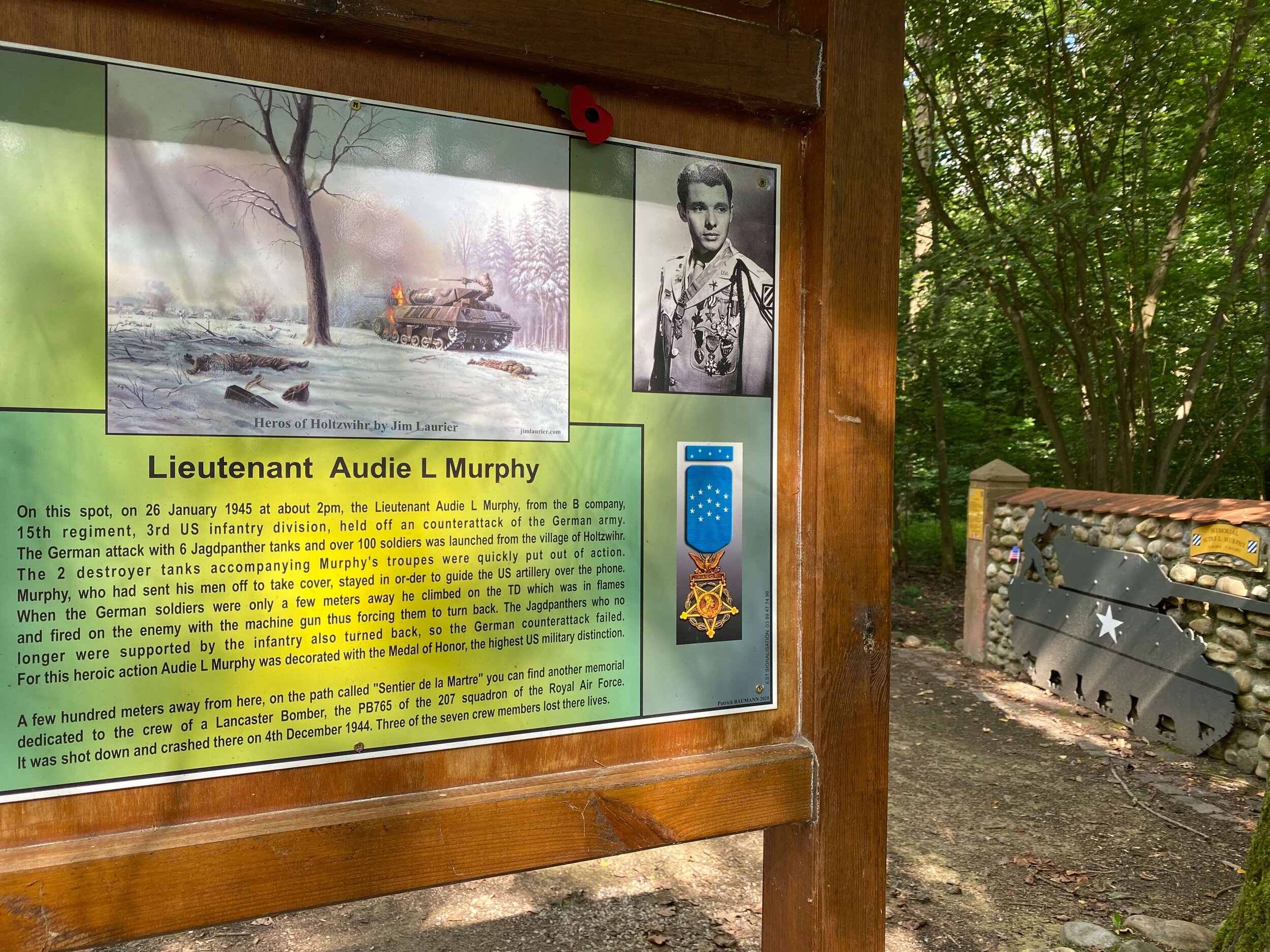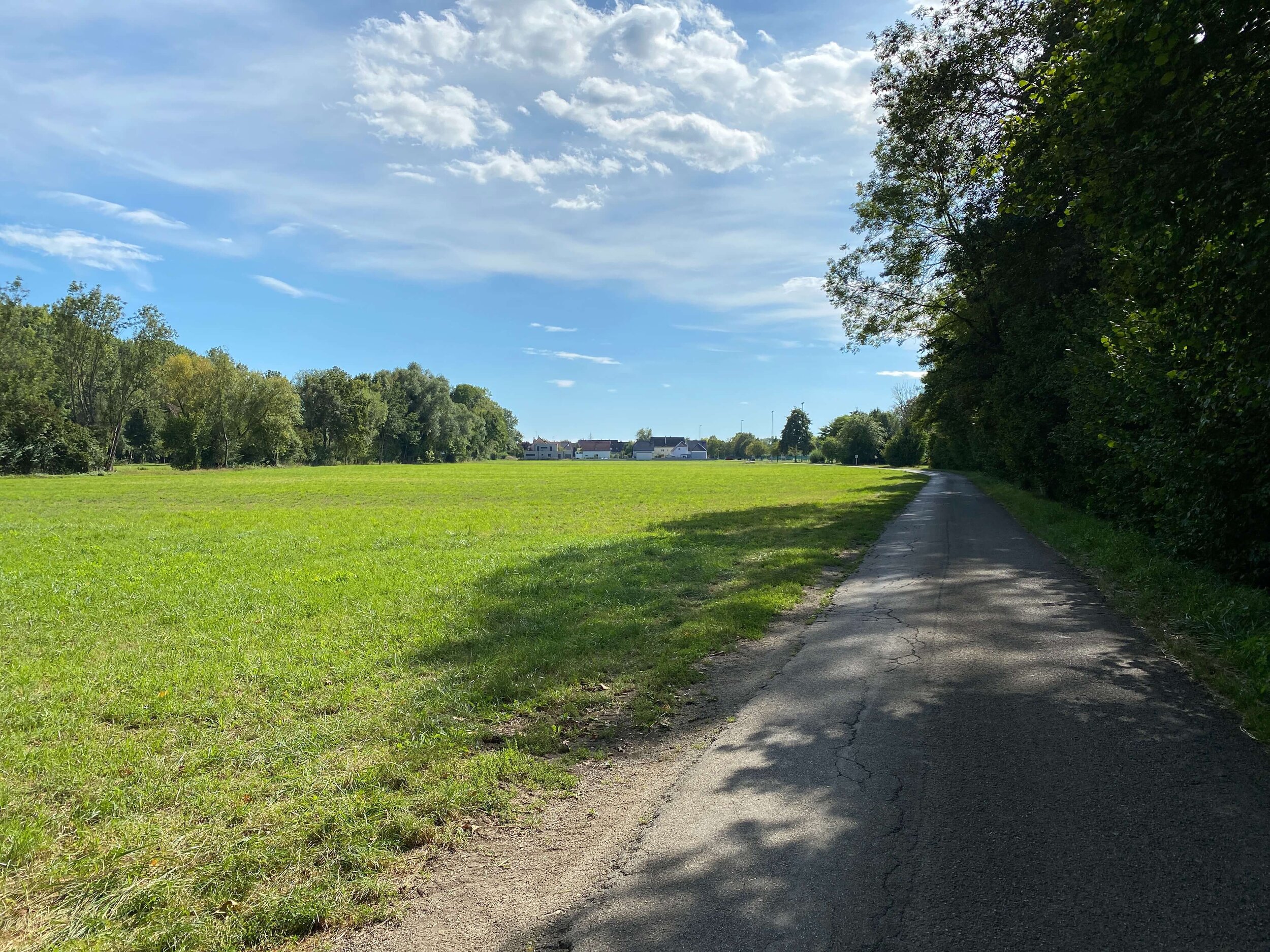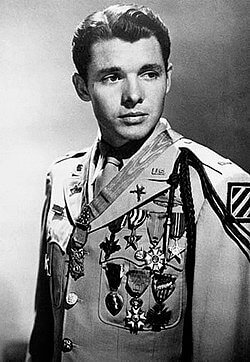Audie Murphy - America's most decorated WWII soldier - 76th anniversary special
Hello and welcome On the Front, where we discuss military history and explore the battlefields today.
In today's episode, we will discuss the battle for Holtzwihr and the heroic actions of Audie Murphy during the fierce fighting in the Colmar Pocket.
Audie Murphy, born on the 20th of June, 1925, was resolute in his efforts to join the U.S. military following the surprise Japanese attack at Pearl Harbor on the 7th of December, 1941. Audie signed up for the Marines but was rejected because he was underage and did not meet the physical requirements coming in at 5 foot 5 and weighing only 100 pounds or 166cm and 45kg's.
Undeterred, over the next seven months, Audie gained an additional 12 pounds, 5 kilo's, and with a falsified affidavit from his sister declaring the then 17-year-old Audie as 18, he was enlisted to the Army. After completing basic training, Audie was assigned to Company B of the 1st Battalion, 15th Infantry Regiment, part of the 3rd Infantry Division.
Development of the Colmar Pocket
In the events leading up to his actions at Holtzwihr, 19-year-old Audie had earned every Army combat award for valor available during his period of service from North Africa, to Italy, to France, and had risen to the rank of first lieutenant. On the day he was awarded the Medal of Honour, he was considered America's most decorated World War II soldier. He received national recognition when Life magazine made him their cover story.
By November 1944, U.S. and French forces to the North and South in Alsace's, France had forced the German's west of the Rhine into a semi-circular bridgehead in what came to be known as the Torn on the Rhine or the Colmar Pocket.
I will discuss these battles in further detail in an upcoming video series, so be sure to subscribe not to miss those videos.
The fighting in and around Colmar's town raged from the 20th of January to the 9th of February, 1945. This campaign has been largely overshadowed by the events occurring at the same time further north during the final days of the Battle of the Bulge.
Audie Murphy monument
Audie Murphy monument
The ferocious fighting in the town of Holtzwihr was pivotal to the Allied war effort to push the last of the German forces out of France and press toward the Rhein. On the 20th of January, it was decided to push the Germans out of France. French attacks to the south of Colmar had been halted by fierce German resistance. The responsibility then fell to the U.S. 3rd Infantry Division under General John W. O'Daniel's command to attack across the Ill River, bypass Colmar, and open a path for the 5th French Armoured Division to cut German supply lines at Neuf-Brisach.
U.S. attacks began on the 22nd of January, and the 30th Infantry regiment captured the Maison Rouge bridge the next day before moving south towards the towns of Riedwihr and Holtzwihr. The bridge at Maison Rouge proved unable to support U.S. tanks and ultimately collapsed, leaving the 30th Infantry regiment with minimal antitank capability. A ferocious German counterattack by the 708th Volksgrenadier Division and 280th Assault Gun Battalion that very afternoon inflicted heavy casualties on the U.S. 30th Infantry regiment who without tank cover and unable to dig foxholes due to the frozen ground were forced to fall back across the river. The 30th Infantry regiment was so devastated it would be out of action for the next three days while reinforcements were called in.
Edge of the Holtzwihr forest and the unit positions of Audie and Company B.
In the days that followed, Audie's 15th Infantry Division was to follow in the footsteps of the 30th and were engaged in bitter fighting. U.S. Engineers were able to construct a bridge further north and, with amour assistance, recaptured the bridge and pushed south to the Holtzwihr forest. By midnight on the 25th of January, Audie's Company B had penetrated 600 yards into the woods and north of Holtzwihr. Advancing through snowy darkness in the early morning hours, company B reached their assigned position before dawn. The fighting to get to this point was so ferocious all B Company officers, except Audie, had been killed, and 102 of 120 enlisted men were killed in action or wounded.
After a short resupply Audie, who was now the company commander, was ordered to take his remaining 18 soldiers to the southern edge of the forest overlooking the town of Holtzwihr and hold their positions until reinforcements arrived. Once there, the weary soldiers began a futile attempt to dig foxholes in the frozen ground. Audie later recalled his men's frustration, stating the night was longer and colder than he ever dreamt it could be. The only benefit of their trivial attempts to dig into the snow-covered granite was the exercise. Fearful of a down attack, Audie, who had now received support from two M10 tank destroyers, began to sure up his position. They were stretched thin, but Audie knew the Germans would have to bring their armor up the main road and positioned both tanks to cover the potential advance.
View from the forest to Holtzwihr town
At 14:00 on the 26th of January, Audie recalled seeing six tanks, and at least 250 Infantry begin to advance from the town. He immediately alerted his troops and got on the field telephone to call for artillery support, but no sooner had he done that "all hell broke loose." The German preliminary artillery barrage opened up on their positions, and the German 2nd Mountain Division rushed across the field. Their objective was the main road leading out of Holtzwihr and eliminating the 3rd Division position.
Once the German units were within range, the two M10 tank destroyers began to return fire but too little effect. Their 90mm shells bounced harmlessly off the heavily armored German tanks' but the 50. and 30. caliber machine guns proved effective against the German infantry advancing across the open terrain. The advancing German units took out B company's machine crew, and the feared 88mm took out the rear M10 tank destroyer, killing the commander and gunner. Undeterred, the forward tank destroyer tried to maneuver to a better firing position but lost control, sliding into a ditch rendering its main gun at a useless angle to engage the enemy. Now sitting ducks, the crew climbed out of the tank and retreated to the cover of the forest.
With both tank destroyers out of action and enemy infantry fast approaching, Audie realized their position was untenable and ordered his men to fall back to safety deep into the forest while he stayed behind and directed artillery fire. With great reluctance, his men fell back. Murphy later recalled, "It was not a heroic act. I figured if one man could do the job, why risk the lives of others."
View from Holtzwihr town road leading towards the monument
With great accuracy, Audie called in the artillery on the advancing German's, later recalling "nothing would stop them." The Germans had advanced to within 50 yards of Audie's position when a lieutenant from battalion headquarters inquired about the enemy's position. Audie replied, "If you just hold the phone a minute, I'll let you talk to one of the bastards." After exhausting all of his ammunition, Audie prepared to fall back when the .50-caliber machine gun on the turret of the burning tank destroyer caught his eye. Full of fuel and ammunition, the burning tank could have exploded at any time; undeterred, Audie climbed on top of the wreckage while bursts of enemy machine gun and small arms ricocheted against the turret.
Knowing the .50 cal would have little effect on the German armor, he purposely targeted the advancing infantry, relying on the fact the German armor would be reluctant to advance without infantry support. The situation before Audie was one of carnage; one unit came within 10 yards of his position. According to Audie, the billowing smoke from the tank destroyer, the crackle of firearms and big shells exploding all around, combined with the constant roar of battle, prevented the Germans from detecting where he was.
Suddenly, two 88mm shells struck the tank destroyer. The explosion's concussion and shock threw Audie violently against the turret, nearly knocking him to the ground. However, he managed to maintain his composure and continued to fire the machine gun, only stopping to reload or relay firing instructions to artillery. Amazingly, Audie's luck continued to hold, and the clouds above broke long enough for American fighter-bombers to assemble above the raging battlefield and strafe the advancing German's.
View from company B position on the edge of Holtzwihr forest
A small group of Germans managed to infiltrate the woods as far back as the 1st Battalion headquarters. However, unable to locate Audie's firing position, most German infantry began to fall back to Holtzwihr. Without infantry support, German armor followed suit. As the Germans began their retreat, Audie's field phone went dead. Now bleeding profusely from a leg wound, he climbed off the tank and limped back to the U.S. positions. Once Audie reached his company, he refused medical attention and immediately organized a counterattack pushing the German's back to Holtzwihr until Company B had reoccupied their original positions.
On the 2nd of June, 1945, Lt. Gen. Alexander Patch, commanding general of the Seventh Army, presented Lieutenant Murphy with the Medal of Honor. The official citation reads in part: "For an hour, the Germans tried every available weapon to eliminate Lieutenant Murphy, but he continued to hold his position….His directing of artillery fire wiped out many of the enemy; he killed or wounded about 50. Lieutenant Murphy's indomitable courage and refusal to give an inch of ground saved his company from possible encirclement and destruction and enabled it to hold the woods, which had been the enemy's objective".
Strengthened by replacements, the 3rd Battalion's, 30th Infantry Regiment, captured the town of Holtzwihr on the 27th of January. The Germans, disheartened by their lack of progress, pulled most of their troops and materiel out of the area. Except for small pockets of enemy resistance, the areas east of the Ill River and north of the Colmar Canal were clear of enemy forces by the 28th of January.
After the war, Audie returned to his hometown in Texas. In September 1945, he was invited to Hollywood by actor James Cagney, who had seen his photo on Life magazine's cover. Murphy himself would become an actor starring in more than 40 films, including "To Hell and Back," where he plays himself and recreates the fateful events of the 26th of January, 1945.
Symptoms of combat stress immediately became evident to Audie's family and friends. Recurring nightmares had him sleep with a loaded pistol under his pillow, and waking up from graphic flashbacks caused him to freeze, reliving a life-threatening moment on the battlefield. Later, Audie would talk candidly about his post-war-related stress to draw more attention to combat experiences' emotional impact on returning Korean and Vietnam veterans. On the 28th of May, 1971, Audie and five others were tragically killed in a plane crash.
In all three, U.S. soldiers would be awarded the medal of honor for their bravery during the battle for the Colmar Pocket. So be sure to hit that subscribe button to hear their stories in the upcoming videos about the Colmar pocket.
Let me know your thoughts about Audie Murphy and his remarkable bravery in those comments below.










